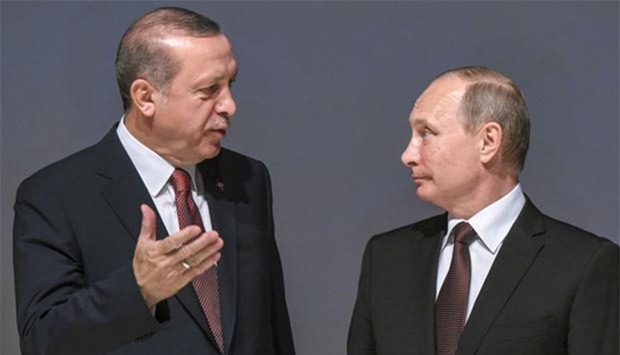Russian President Vladimir Putin met Turkish counterpart Recep Tayyip Erdogan in Istanbul on Monday, pushing forward ambitious joint energy projects on his first visit to Turkey since a crisis in ties.
Only a few months ago, the two post-imperial strongmen were exchanging bitterly personal accusations after Turkey shot down a Russian war plane on the Syrian border last November.
But after a June agreement to normalise ties, this was the pair's third meeting following an initial ice-breaking meeting in Saint Petersburg and an encounter on the sidelines of the G20 in China in September.
Before their meeting began at the Ottoman-era Yildiz Palace in Istanbul, the pair reaffirmed their commitment to the planned TurkStream gas pipeline to pump Russian gas under the Black Sea to Europe in speeches to an energy congress.
Speaking at the World Energy Congress, Putin vowed that the project would be realised, while Erdogan said work was already under way and Turkey looked on it "positively".
Putin also congratulated Erdogan for defeating the July 15 coup bid against his rule, saying Russia had been very concerned by the situation and was "glad" Turkey was now recovering.
'Healing process'
Yet the two countries still face a major task to raise relations to the level enjoyed before the jet crisis.
Economic sanctions imposed by Russia -- now gradually being lifted -- have severely dented trade. And a ban on charter flights to Turkey, which is also now over, reduced the usually substantial flow of Russian tourists to a trickle.
Russia and Turkey remain at odds over the Syria conflict, with Moscow a key backer of the regime of President Bashar al-Assad while his exit from power is Turkey's key strategic aim.
But Turkey, which just months ago was loudly accusing Russia of war crimes in Syria, has been remarkably tight-lipped over the Syrian regime onslaught on rebel-held areas of Aleppo in recent weeks, as ties with Moscow have tentatively improved.
In his speech to the congress, Erdogan complained how a child in Aleppo "only sees bombs dropped by helicopters and planes that target them" but made no mention of Russia or the Assad regime.
"Let's exert efforts together for an end to clashes in Syria," he said.
Analysts have long noted an ability on the part of Moscow and Ankara to show pragmatism in times of good relations and push disputes to one side, concentrating on strategic cooperation that includes a goal to reach annual two-way trade of $100bn.
Andrew Neff, principal analyst for the CIS and eastern Europe at IHS Energy, said that while it may take more time for relations to recover, Turkey and Russia have decided to focus on areas where they can work together.
"Something more along the lines of a healing process has begun with both sides eager to put the ugliness of the past 10 months behind them, aiming to focus on areas like energy where they have mutual interests in cooperation," he told AFP.
Pipeline or pipe dream?
The TurkStream pipeline is planned to pump 31.5bn cubic metres per year of Russian gas to Europe, helping Moscow limit the gas transit through Ukraine.
But analysts have long been sceptical of its economic rationale and its actual construction has yet to start.
"TurkStream is still more pipe dream than pipeline, and the resumption of political and commercial ties only gets us back to the starting line, not necessarily on the track to the finish line," said Neff.
He added that the target of 2017 to start pipe-laying seemed "overly optimistic" at this stage.
Russia is also slated to build Turkey's first nuclear power station in Akkuyu on the Mediterranean, a project which Erdogan sees a pillar of the hydrocarbon-poor country's drive for greater energy self-sufficiency.
Erdogan said Turkey wanted to produce around 10 percent of its electricity from nuclear energy, with Akkuyu the first of three planned nuclear plants.

Russian President Vladimir Putin listens to Turkish President Recep Tayyip Erdogan during the 23rd World Energy Congress in Istanbul on Monday.
